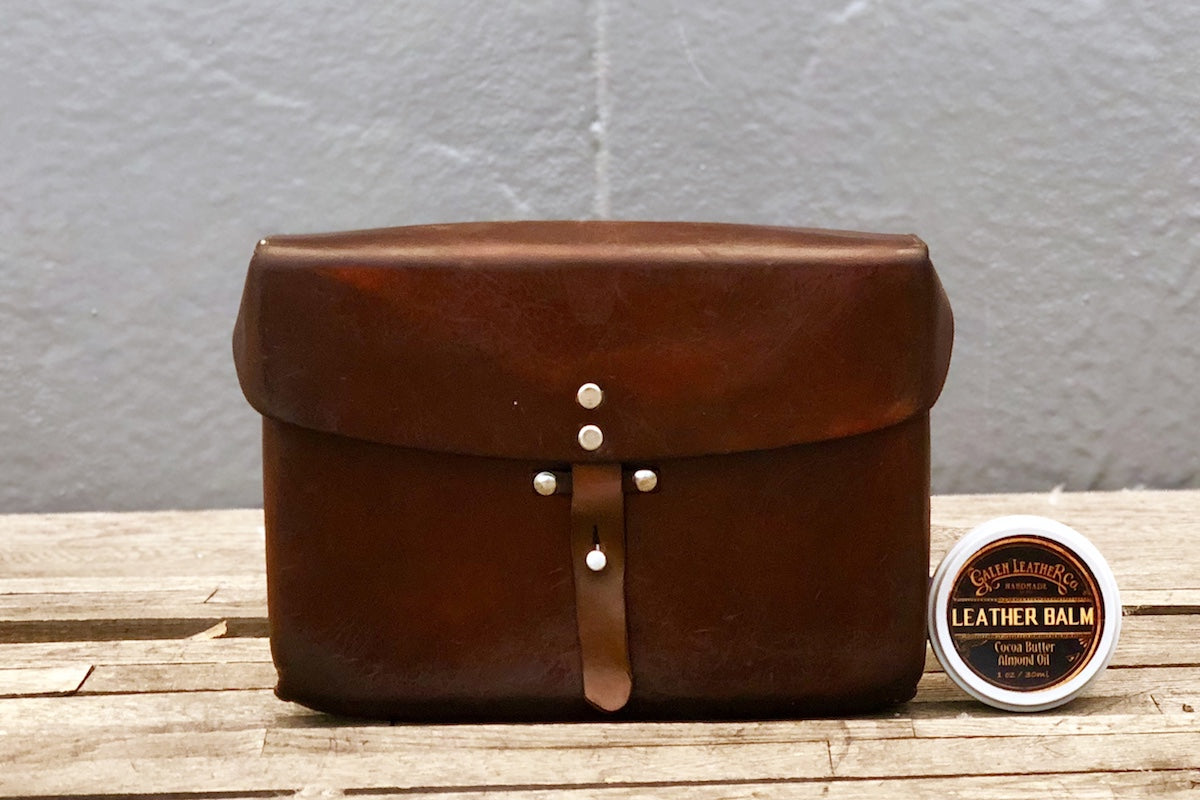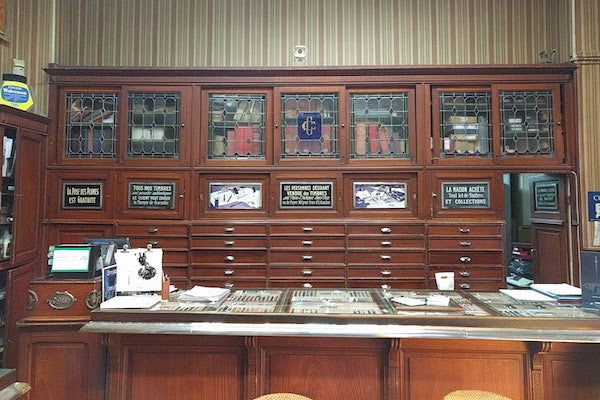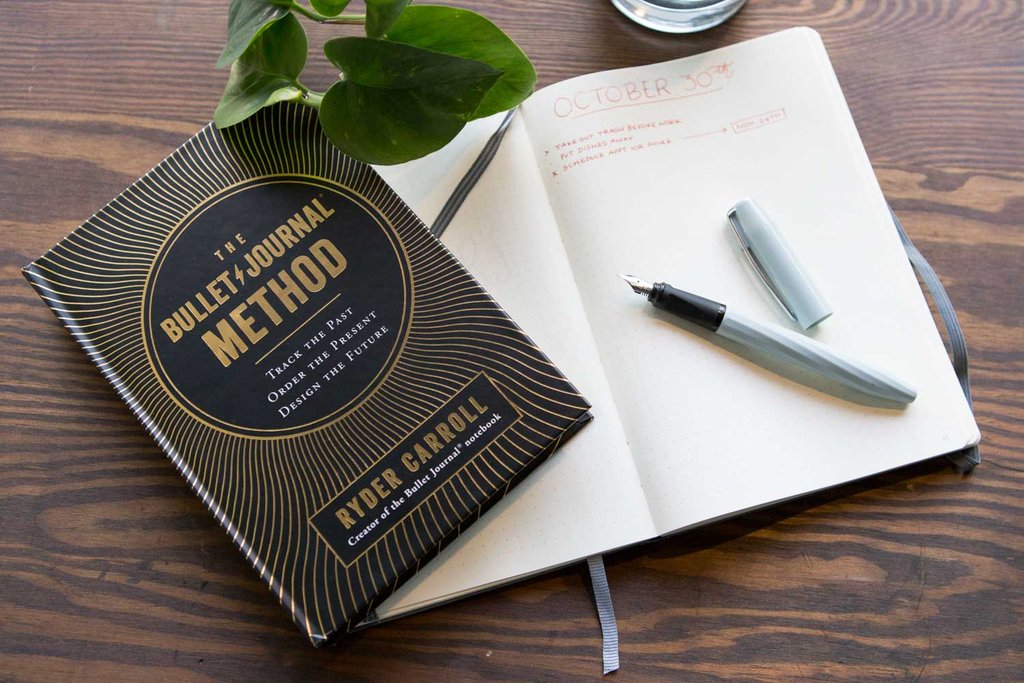How to Condition Leather The Right Way Like a Pro

At Galen Leather, we know leather inside and out, with years of experience crafting high-quality leather goods.
If you’ve invested in a product made of high-quality leather, then you’ll want to keep it in top shape. Caring for your leather will help it give you the long life and durability for which it was created — and that you expect.
Conditioning your leather periodically is a great way to keep your leather smooth, supple, and in great shape for years to come.
Best of all, you don’t need to take your leather somewhere else to have it conditioned. Leather conditioning is easy to do yourself, as long as you have a few necessary tools. Whether it's for your journal cover, leather journal, leather dopp kit or a handmade leather wallet, and so long as it's real leather, you'll find these tips will work.
Leather Conditioning the Right Way
Leather conditioners are products that are designed to moisturize your leather goods and help keep the fibers pliable. There are lots of commonly available leather conditioners; the one you choose will depend upon the type of leather, how it’s used, and your own preference. Our very own leather conditioning cream is an all natural solution that contains natural oils to condition and treat your leather for long lasting wear.
Let’s look at other ways to keep your leather conditioned and in top shape.
-
Spot or Deep Clean
Before you condition your leather, you’ll want to make certain that your shoes, bag, belt, wallet — whatever leather goods you’re conditioning — are nice and clean.
To spot-clean leather, use a bit of water and a soft-bristled brush to remove any grime, grit, or dirt that is marring the leather. Then, use a clean, dry, soft cloth to wipe away any remaining dirt.
If your leather is grimy or dirty, you may need to use a leather cleaner or a leather soap to get the dirt out. Follow the directions on the bottle of cleaner or bar of soap, then wipe the leather with a clean, dry cloth and let dry completely before continuing.
Don’t rush ahead — it’s crucial that your leather be completely dry, or the conditioning treatment won’t be absorbed into the leather fibers properly.
-
Test a Spot First
Before you try a new leather conditioner on your leather goods, always make sure you test it out on an inconspicuous place. On purses, this can be the bottom of the bag; on shoes, a spot at the base of the heel; on belts, the area where the belt overlaps.
This is an essential step since some leather conditioners can cause permanent discoloration. High-quality leathers like full-grain or aniline leathers are particularly susceptible, but marring and discoloration can happen on any quality or grade of leather.
To test, rub a small amount of the conditioner into a small spot with a soft, clean cloth and then let it dry for at least 24 hours before checking the results.
If there is no color change to your leather, you can proceed safely with conditioning the rest of the piece. There is no need to test again on that piece in the future if you continue to use the same brand and type of conditioner.
-
Condition Your Leather
Once you’ve found a leather conditioner that you like that doesn’t mar your leather, you can condition your leather goods whenever you feel like the leather is getting dull or dry.
Some experts advocate conditioning every six to 12 months, but this is entirely dependent on the environment your leather is in, the amount of use it gets, and your own preferences.
Leather conditioner is a moisturizer, and, just like the skin on your body, leather will soak it up.
This means that you shouldn’t expect your leather to be shiny just because you’ve applied conditioner. Leather fibers, like skin, will drink in the conditioner, absorbing as much as it can. The excess can be wiped away with a soft cloth, leaving a smooth, supple surface.
There are several products you can use to condition all types of leather:
- Leather creams — provide moisture with the least change in color and are great for aniline leathers
- Leather oils — Natural oils like lanolin and neatsfoot can help soften leather
- Leather waxes — Waxes don’t moisturize as well, but they do provide more waterproofing
Caring for Your Leather with Leather Balm

Old Swiss Army Bag - Before and after Galen Leather Balm
A Note on Lanolin
Lanolin is the naturally-produced wax derived from sheep. Like humans produce sebum, sheep generate lanolin.
Many style gurus and leather companies argue either for or against the use of lanolin on leather, but it’s entirely dependent on your taste. Lanolin is a good moisturizer, but it tends to soften leathers more than an over-the-counter brand-name leather conditioner.
For jackets, shoes, and sometimes purses, this may be okay. However, many people would rather have their leather feel stiff and rugged. It’s up to you!
If you happen to get an ink stain on your leather product, please refer to our guide to remove pen ink.
Keeping Your Leather in Good Shape for a Lifetime of Use
Conditioning your real leather with the leather moisturizing product of your choice can help preserve the rich, supple texture of your leather, keep it from cracking and splitting, and prolong its usable life.
Whether you choose lanolin or one of the many other leather creams and lotions, having a leather conditioning habit built into your leather-care ritual will increase the beauty of your leather as well as extending its life.
FAQs About Leather Conditioning & Care
- +How often should you condition leather?
- Condition leather every 6 to 12 months, or whenever it starts to feel dry or look dull. Frequency depends on usage and climate. If your leather is exposed to heat, sunlight, or daily wear, conditioning more often can prevent cracking and keep it supple. At Galen Leather, we recommend letting the feel and look of the leather guide your timing.
- +What is the best way to condition leather?
- Start with clean, dry leather. Apply a small amount of conditioner with a soft cloth using circular motions. Let it absorb fully, then wipe away any excess. Always test a small hidden area first. Proper conditioning keeps the fibers nourished and the surface smooth, helping your leather last for years.
- +Can you over-condition leather?
- Yes — over-conditioning can make leather too soft, sticky, or even damage the fibers over time. Using too much product or conditioning too frequently may clog the leather’s pores. We recommend a light application only when your leather truly needs it. Think of it like skincare: hydration is great, but more isn’t always better.
- +What is the best leather conditioner?
- The best leather conditioner is one that moisturizes deeply without damaging the material. Look for natural ingredients like oils and beeswax, which nourish and protect. Galen Leather Balm is an all-natural option ideal for full-grain leather, restoring softness while adding a light, protective finish.
- +Should you clean leather before conditioning?
- Always clean leather before conditioning. Dirt and residue can prevent conditioner from absorbing and may even damage the leather if sealed in. Use a soft brush or damp cloth for light cleaning, or a leather-specific cleaner for deeper grime. Let the surface dry completely before applying any conditioner to ensure even absorption.
- +Is lanolin good for leather?
- Lanolin is a natural softener and can be great for conditioning leather, especially for items like jackets or shoes. It penetrates deeply and restores moisture, but it may overly soften structured pieces. If you prefer your leather to maintain a firmer feel — like with bags or cases — go light on lanolin or opt for a balanced balm.
2 Responses
POP JOHNSON
SOMEWHERE AROUND THE YEAR 1960 OR 1961, LETS JUST SAY LONG AGO, MY GRANDFATHER WHO WAS BORN IN THE 1870’S, STARTED TEACHING ME HOW TO TREAT AND MAKE LEATHER ITEMS FOR THE FARM. THE BARN HAD A TACK ROOM WHERE WE WORKED OUR LEATHER. WE USED THE HOME COLLECTED LANOLIN FROM THE SHEEP, SOAP HOMEMADE BY GRANDMA. LATER THE USMC TAUGHT ME HOW TO SHINE EVERYTHING IN SIGHT, STRIP THE DYE OUT OF LEATHER, RE-DYE AND SPIT SHINE ALL OF MY INSPECTION EQUIPMENT. I TREATED MY FIELD OR WAR GEAR LEATHER BY USING LANOLIN AND BEES WAX MELTED TOGETHER AND SMEARED ALL OVER AND WIPED DOWN AND KEEP DULL TO PREVENT SHINING IN THE SUN OR THE TOTAL DARKNESS. I HAD DRY FEET ON MANY OCCASIONS UNLESS I JUMPED INTO THE WATER ABOVE THE TOP OF MY BOOTS. USE AN OLD SOFT COTTON T-SHIRT, A LITTLE WATER AND GALEN LEATHER CONDITIONER, AFTER IT IS GOOD AND DRY, USE THE SAME T-SHIRT AS IT WILL BECOME VERY SOFT, THEN SPIT SHINE YOUR LEATHER, OR SIMPLY USE A CLEAN NEW SHOE BRUSH FOR THAT SPECIAL TREATMENT OF YOUR LEATHER. TAKE YOUR TIME AND THINK, WHILE YOU WORK YOUR LEATHER. THINK ABOUT HOW LUCKY WE ARE TO STILL BE ABOVE DIRT TO COME UP WITH IDEAS TO USE YOUR WORLD OF LEATHER ON YOUR NEXT PROJECT. LEATHER WORKING IS PROBABLY IN THE TOP FIVE THINGS MANKIND HAD TO LEARN, PROBABLY ON THE FIRST LEVEL OF NEEDS, RIGHT AFTER FINDING FOOD. LEATHER CAME BEFORE METAL. THERE IS MUCH TO THINK ABOUT WHEN IT COMES TO LEATHER, I WOULD SAY A LIFETIMES WORTH. ENJOY THE PEACE I ENJOY.🍀
Justin
Wow – the before and after shot of the bag is phenomenal. Kicking myself for not adding the balm to my last order.
Leave a comment
Comments will be approved before showing up.
Also in Blog

Paris Fountain Pen and Fine Stationery Stores

A Review of the Jibun Techo Japanese Planner System
The Jibun Techo is divided into three booklets: LIFE, DIARY and IDEA. From the start it feels really satisfying to have them stacked all together. It suggests that it is a very substantial system before you even begin exploring it. For an in depth review of a new user's experience using the Jibun Techo planner, then read on.




Katy Klassman
Author
Katy worked in a stationery shop for nearly a decade, so She’s educated on many products and stationery client questions. She is also stationery - planner - fountain pen fanatic.